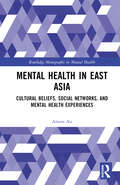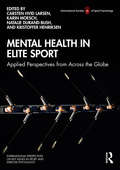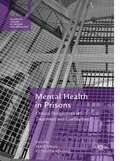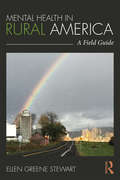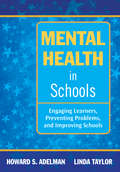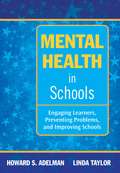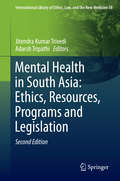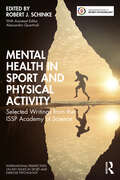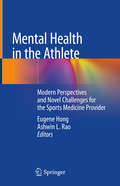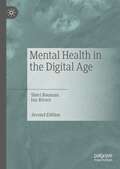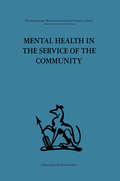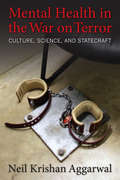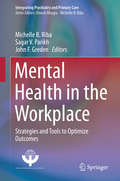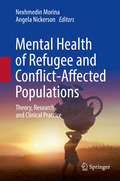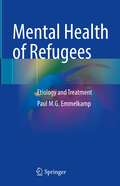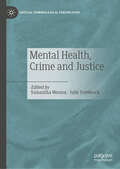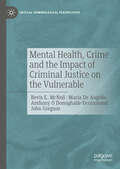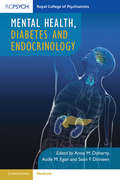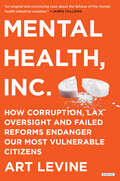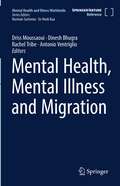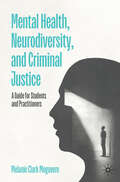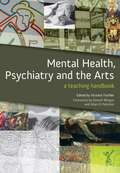- Table View
- List View
Mental Health in East Asia: Cultural Beliefs, Social Networks, and Mental Health Experiences (Routledge Monographs in Mental Health)
by Anson AuThis pioneering monograph examines how culture informs popular understandings and experiences of mental health in East Asia, as well as providing resolutions for the future. Questions about mental health problems have gained new urgency as their consequences are growing more visible in East Asia. Yet, our understanding, funding, and evidence has not kept pace. Anson Au explores the social and psychological concepts, and network structures that make up the blueprint of East Asian cultures and untangles their myriad of influences on how people think, feel, and trust with respect to mental health experiences. Chapters explore themes such as cultural beliefs about mental health, the role of social support and social media, and mental health stigma. Drawing on the latest quantitative evidence, network science, and novel qualitative data, this book paints a portrait of mental health in the region and articulates culturally sensitive policies and practices tailored for East Asian cultures that improve mental health experiences.
Mental Health in Elite Sport: Applied Perspectives from Across the Globe (ISSP Key Issues in Sport and Exercise Psychology)
by Carsten Hvid LarsenMental Health in Elite Sport: Applied Perspectives from Across the Globe provides a focused, exhaustive overview of up-to-date mental health research, models, and approaches in elite sport to provide researchers, practitioners, coaches, and students with contemporary knowledge and strategies to address mental health in elite sport across a variety of contexts. Mental Health in Elite Sport is divided into two main parts. The first part focuses globally on mental health service provision structures and cases specific to different world regions and countries. The second part focuses on specific mental health interventions across countries but also illustrates specific case studies and interventions as influenced by the local context and culture. This tour around the world offers readers an understanding of the massive global differences in mental health service provision within different situations and organizations. This is the first book of its kind in which highly experienced scholars and practitioners openly share their programs, methods, reflections, and failures on working with mental health in different contexts. By using a global, multi-contextual analysis to address mental health in elite sport, this book is an essential text for practitioners such as researchers, coaches, athletes, as well as instructors and students across the sport science and mental health fields.
Mental Health in Prisons: Critical Perspectives on Treatment and Confinement (Palgrave Studies in Prisons and Penology)
by Alice Mills Kathleen KendallThis book examines how the prison environment, architecture and culture can affect mental health as well as determine both the type and delivery of mental health services. It also discusses how non-medical practices, such as peer support and prison education programs, offer the possibility of transformative practice and support. By drawing on international contributions, it furthermore demonstrates how mental health in prisons is affected by wider socio-economic and cultural factors, and how in recent years neo-liberalism has abandoned, criminalised and contained large numbers of the world’s most marginalised and vulnerable populations. Overall, this collection challenges the dominant narrative of individualism by focusing instead on the relationship between structural inequalities, suffering, survival and punishment. Chapter 2 of this book is available open access under a CC BY 4.0 license via link.springer.com.
Mental Health in Rural America: A Field Guide
by Ellen Greene StewartThis book provides a comprehensive overview of mental health in rural America, with the goal of fostering urgently needed research and honest conversations about providing accessible, culturally competent mental health care to rural populations. Grounding the work is an explanation of the history and structure of rural mental health care, the culture of rural living among diverse groups, and the crucial "A’s" and "S": accountability, accessibility, acceptability, affordability, and stigma. The book then examines poverty, disaster mental health, ethics in rural mental health, and school counseling. It ends with practical information and treatments for two of the most common problems, suicide and substance abuse, and a brief exploration of collaborative possibilities in rural mental health care.
Mental Health in Schools: Engaging Learners, Preventing Problems, and Improving Schools
by Howard S. Adelman Dr Linda TaylorThis visionary and comprehensive book presents a new approach to school-based mental health, including how to better serve students and maximize resources through coordinated programs.
Mental Health in Schools: Engaging Learners, Preventing Problems, and Improving Schools
by Howard S. Adelman Linda TaylorFor many children, schools are the main or only providers of mental health services. In this visionary and comprehensive book, two nationally known experts describe a new approach to school-based mental health—one that better serves students, maximizes resources, and promotes academic performance. The authors describe how educators can effectively coordinate internal and external resources to support a healthy school environment and help at-risk students overcome barriers to learning. School leaders, psychologists, counselors, and policy makers will find essential guidance, including: • An overview of the history and current state of school mental health programs, discussing major issues confronting the field • Strategies for effective school-based initiatives, including addressing behavior issues, introducing classroom-based activities, and coordinating with community resources • A call to action for higher-quality mental health programming across public schools—including how collaboration, research, and advocacy can make a difference Gain the knowledge you need to develop or improve your school's mental health program to better serve both the academic and mental health needs of your students!
Mental Health in Social Work: A Casebook on Diagnosis and Strengths-based Assessment
by Jacqueline Corcoran Joseph WalshMental Health in Social Work: A Casebook on Diagnosis and Strengths-based Assessment emphasizes gaining competency in the DSM-5 diagnoses of mental disorders that are commonly seen in clinical and social service settings. Using a case-based approach, students and professionals learn to understand clients holistically as they proceed with the assessment and intervention process. <p><p> The 3rd Edition includes new chapters on obsessive-compulsive disorder (Ch. 9), post-traumatic stress disorder (Ch.10), and gender dysphoria (Ch. 14) It also includes additional content on socially diverse populations throughout the text, and new “Questions to Consider” for making a DSM diagnosis are included with each case study.
Mental Health in South Asia: Ethics, Resources, Programs and Legislation
by Jitendra Kumar Trivedi Adarsh TripathiAsia is by far the largest continent in the world in terms of area with population exceeding 3. 5 billion and has dozens of cultures, religions, languages and ethnic groups. As a result of its highly varied political systems, Asia also spawns a wide variety of health care systems including mental health care systems, often based on historical roots and at times colonial heritages. The people who suffer from mental or neurological disorders in the continent form a vulnerable section of society and often face stigma, discrimination and marginalization in all societies, and this increases the likelihood that their human rights will be violated This book tackles the issue of mental health legislation in South Asia The first of its kind, it addresses an issue that is necessary for protecting the rights of people with mental disorders and serves as an essential text for reinforcing mental health policy in South Asia It is a timely addition to our global understanding of mental health and how different regions address it.
Mental Health in Sport and Physical Activity: Selected Writings from the ISSP Academy of Science (ISSP Key Issues in Sport and Exercise Psychology)
by Robert J. Schinke Alessandro QuartiroliBringing together the most prestigious writings on mental health in sport and physical activity from the International Society of Sport Psychology’s flagship journal, International Journal of Sport and Exercise Psychology, this volume provides an essential reference for the field of sport and exercise psychology.Carefully selected for their popularity and impact on the field, the chapters in this volume feature an international range of contributions. Each chapter has been closely updated to ensure its relevance in current research and maintain its position as a piece of state-of-the-art scholarship. Chapters cover a range of topics, including the mental health of high-performance athletes, assessment methods and screening tools, adjustment patterns in the junior to senior transition, the role of perfectionism, body shaming, mindfulness, and exercise addiction. The book concludes with a discussion of key takeaways from the preceding chapters and suggestions for future opportunities. Endorsed by the Society’s Academy of Science, this volume is an authoritative series of writings on mental health in sport and physical activity.Brought together in a single volume for the first time, the book is a must-have for graduate students, scholars, and professions in sport and exercise psychology.
Mental Health in a Multi-Ethnic Society: A Multidisciplinary Handbook
by Frank Keating Suman FernandoThis new edition of Mental Health in a Multi-Ethnic Society is an authoritative, comprehensive guide on issues around race, culture and mental health service provision. It has been updated to reflect the changes in the UK over the last ten years and features entirely new chapters by over twenty authors, expanding the range of topics by including issues of particular concern for women, family therapy, and mental health of refugees and asylum seekers. Divided into four sections the book covers: issues around mental health service provision for black and minority ethnic (BME) communities including refugees and asylum seekers critical accounts of how these issues may be confronted, with examples of projects that attempt to do just that programs and innovative services that appear to meet some of the needs of BME communities a critical but constructive account of lessons to be drawn from earlier sections and discussion of the way ahead. With chapters on training, service user involvement, policy development and service provision Mental Health in a Multi-Ethnic Society will appeal to academics, professionals, trainers and managers, as well as providing up-to-date information for a general readership.
Mental Health in the Athlete: Modern Perspectives and Novel Challenges for the Sports Medicine Provider
by Eugene Hong Ashwin L. RaoThis unique book provides a practical framework for and coverage of a broad range of mental health concerns applicable to the care of athletes, including depression, suicide, mood disorders, substance abuse and risk-taking behaviors. To this end, it presents content relevant to the care of athletes, including doping and the use of performance-enhancing drugs, the mental health impact of concussion, bullying and hazing, the impact of social media and exercise addiction, among other pertinent topics. Current basic and translational research on behavioral health and the relationship of brain to behavior are reviewed, and current treatment approaches, both pharmacological and non-pharmacological (including mindfulness training), are considered. This practical resource targets the stigma of mental in athletes in order to overcome barriers to care by presenting a definitive perspective of current concepts in the mental health care of athletes, provided by experts in the field and targeting sports medicine providers, mental health providers and primary care physicians involved in the direct care of recreational and competitive athletes at all levels.
Mental Health in the Digital Age
by Sheri Bauman Ian RiversThis second edition of this highly impactful book examines the intersection of mental health and digital technology to make informed decisions about the new options provided by digital technology. It highlights the rise in online therapy and social media and examines the ethical dilemmas involved in online research to suggest that the benefits created far outweigh the possible risks. This expanded and updated second edition, includes practical suggestions for clinicians and public, builds upon the first by updating readers on recent developments in technology and research in this area since 2015. It explores ways in which governments and practitioners responded to the mental health crisis caused by the Covid-19 pandemic, and looks at the challenges as well as the benefits of our increasing interaction online.
Mental Health in the Service of the Community: Volume three of a report of an international and interprofessional study group convened by the World Federation for Mental Health
by Kenneth Soddy Robert H AhrenfeldtTavistock Press was established as a co-operative venture between the Tavistock Institute and Routledge & Kegan Paul (RKP) in the 1950s to produce a series of major contributions across the social sciences. This volume is part of a 2001 reissue of a selection of those important works which have since gone out of print, or are difficult to locate. Published by Routledge, 112 volumes in total are being brought together under the name The International Behavioural and Social Sciences Library: Classics from the Tavistock Press. Reproduced here in facsimile, this volume was originally published in 1967 and is available individually. The collection is also available in a number of themed mini-sets of between 5 and 13 volumes, or as a complete collection.
Mental Health in the War on Terror: Culture, Science, and Statecraft
by Neil Krishan AggarwalNeil Krishan Aggarwal's timely study finds that mental-health and biomedical professionals have created new forms of knowledge and practice in their desire to understand and fight terrorism. In the process, the state has used psychiatrists and psychologists to furnish knowledge on undesirable populations, and psychiatrists and psychologists have protected state interests.Professional interpretation, like all interpretations, is subject to cultural forces. Drawing on cultural psychiatry and medical anthropology, Aggarwal analyzes the transformation of definitions for normal and abnormal behavior in a vast array of sources: government documents, professional bioethical debates, legal motions and opinions, psychiatric and psychological scholarship, media publications, and policy briefs. Critical themes emerge on the use of mental health in awarding or denying disability to returning veterans, characterizing the confinement of Guantánamo detainees, contextualizing the actions of suicide bombers, portraying Muslim and Arab populations in psychiatric and psychological scholarship, illustrating bioethical issues in the treatment of detainees, and supplying the knowledge and practice to deradicalize terrorists. Throughout, Aggarwal explores this fascinating, troublesome transformation of mental-health science into a potential instrument of counterterrorism.
Mental Health in the Workplace: Strategies and Tools to Optimize Outcomes (Integrating Psychiatry and Primary Care)
by Michelle B. Riba Sagar V. Parikh John F. GredenThis book offers a guide to better understanding models of workplace mental health, as well as best practices for mental health professionals, employee assistance groups, employers and employees alike. The cost of depression at the workplace is staggering, both in terms of absenteeism and productivity loss while at work, and in terms of human and family suffering. Depression is highly prevalent and affects employees’ concentration, decision-making skills and memory, contributing to accidents and quality issues. Analyses indicate that the returns on investment for workplace mental health programs are significant, with employers reporting lower productivity-related financial losses and less need staff turnover due to mental health conditions. The book also addresses substance use and misuse, and ways to address such problems.
Mental Health of Refugee and Conflict-Affected Populations: Theory, Research and Clinical Practice
by Nexhmedin Morina Angela NickersonThis book provides an overview of theoretical, empirical, and clinical conceptualizations of mental health following exposure to human rights violations (HRV). There are currently hundreds of millions of individuals affected by war and conflict across the globe, and over 68 million people who are forcibly displaced. The field of refugee and post-conflict mental health is growing exponentially, as researchers investigate the factors that impact on psychological disorders in these populations, and design and evaluate new treatments to reduce psychological distress. This volume will be a substantial contribution to the literature on mental health in refugee and post-conflict populations, as it details the state of the evidence regarding the mental health of war survivors living in areas of former conflict as well as refugees and asylum-seekers.
Mental Health of Refugees: Etiology and Treatment
by Paul M.G. EmmelkampThe book provides a comprehensive review of mental health in refugees by discussing its multiple dimensions, and analyzing epidemiology, etiology, and culturally adapted assessment and treatment. Key topics include why certain refugees cope successfully with traumatic experiences while others do not, and the biological, psychological, and social processes underlying posttraumatic stress disorder, common mental disorders, substance abuse and personality disorders.The text examines topics such as complexities of diagnosis, treatment, and recovery for refugees. Furthermore, the roles of culture, social support, and mental health workers in the process of overcoming mental health problems in refugees are discussed. Together, the chapters provide an in-depth examination of the current understood causes, and impacts of mental health problems and treatment of refugees to inform future work in the field. The book gives its readers a solid basis for understanding mental health problems of refugees and sets out to present practitioners with a state-of-the-art summary of all the latest developments and practical guidance. Furthermore, this book provides the practitioner with instructions on how culturally adapted treatments can be used not only with adults, but also with children and young people to help the practitioner to prepare for working with this difficult client group. Drawing from a range of different fields of study, this text will appeal to readers across psychological, mental health, medical, and academic disciplines.
Mental Health, Crime and Justice (Critical Criminological Perspectives)
by Samantha Weston Julie TrebilcockMental Health, Crime and Justice brings together original and state of the art contributions from theoretical, empirical, and policy-related scholarship concerned with the ways people with mental health illnesses are understood, ‘managed’, ‘controlled’ and responded to. Drawing on critical scholarship from a variety of disciplines, the collection pays careful attention to the controversial relationship between mental health and crime, as well as key issues relating to justice and social harm. It presents a synthesis of discipline-specific approaches, from law, psychiatry, sociology, and criminology, but will also bridge together developments in both theory and practice. The book explores the relationship between mental health and crime by deconstructing and analysing two important facets of the justice system: (1) the various ways in which people with mental disorder navigate and are navigated through the criminal justice (and forensic mental health) system(s); and (2) how so called ‘problematised populations’ are governed, with a particular emphasis on mental health as an unfolding dimension of social harm. Unique to this volume, well-rehearsed debates are cross-examined with contemporary critiques about social harm and justice. By considering the multifaceted dimensions of violence to include ‘gendered’, ‘structural’, and ‘systemic’, this book provides a nuanced insight that exposes the controversial relationship that is said to exist between mental health and crime. The collection seeks to highlight the harm and injustice that people with mental health disorders are subject to when interacting with the criminal justice system.
Mental Health, Crime and the Impact of Criminal Justice on the Vulnerable (Critical Criminological Perspectives)
by John Gregson Bevis E. McNeil Maria De Angelis Anthony Ó Donnghaile-DrummondThis book addresses a variety of key issues surrounding mental health and the criminalization of certain individuals and groups by the Criminal Justice System and the impact this can have on their mental health. It challenges the assumption that people with mental health problems are in some way a risk or danger to society (and themselves) and therefore have a greater propensity for committing crimes, when in reality they are more likely to become the victims of crime. It argues that the misguided correlations drawn between mental health and crime, as perpetuated by the media, policy makers, clinicians, agents of the criminal justice system, and ultimately the public, lead to the criminalization of the vulnerable. Furthermore, the criminalization, stigmatization, stereotyping, labelling and discrimination endured by people with mental health problems has a devastating effect on their mental health and well-being and has negative consequences for society as a whole. Each chapter focuses on a specific area relating to mental health, identifying key themes and issues, as well as offering recommendations for improvements with regards to the treatment and support for people with mental health problems. In addition, the treatment of offenders with mental health problems who engage with the criminal justice system and its services, such as the police, prison and probation services, is critically evaluated.
Mental Health, Diabetes and Endocrinology (Mental Health and)
by Anne M. Doherty Aoife M. Egan Seán F. DinneenMental Health, Diabetes and Endocrinology examines the main areas of clinical overlap between endocrinology and mental health to address key clinical conundrums. Drawing on the most recent developments from literature and clinical practice, this book gives specific attention to the main areas where clinical conundrums and treatment challenges arise across endocrinology, psychiatry, psychology and primary care. Common challenges in this area include depression which can impact on the person's ability to self-care and to adhere to treatment with consequences for their morbidity and mortality; 'diabulaemia' associated with high mortality rates; obesity and associated mental disorders; cognitive impairment and mental capacity; anti-psychotic medications and their endocrine sequelae; and specific setting-related considerations. Mental Health, Diabetes and Endocrinology is a useful resource for the overlapping conditions across these specialities, and provides clinically-focussed evidence-based resources for all health care professionals who encounter these issues.
Mental Health, Inc.: How Corruption, Lax Oversight and Failed Reforms Endanger Our Most Vulnerable Citizens
by Art LevineThe mental health system in America is hardly the front-burner issue it should be, despite lip service about reform after each new tragic mass killing. Yet every American should care deeply about fixing a system a presidential commission reported was in “shambles.” By some measures, 20 percent of Americans have some sort of mental health condition, including the most vulnerable among us—veterans, children, the elderly, prisoners, the homeless.With Mental Health, Inc., award-winning investigative journalist Art Levine delivers a Shock Doctrine-style exposé of the failures of our out of control, profit-driven mental health system, with a special emphasis on dangerous residential treatment facilities and the failures of the pharmaceutical industry, including the overdrugging of children with antipsychotics and the disastrous maltreatment of veterans with PTSD by the scandal-wracked VA.Levine provides compelling narrative portraits of victims who needlessly died and some mentally ill people who won unexpected victories in their lives by getting smart, personalized help from “pyschosocial” programs that incorporate safe and appropriate prescribing, along with therapy and social support. He contrasts their stories with corrupt Big Pharma executives and researchers who created fraudulent marketing schemes. Levine also tells the dramatic David vs. Goliath stories of a few brave reformers, including Harvard-trained psychiatrist and researcher Dr. Stefan Kruszewski, who has acted as a whistleblower in several major cases, leading to important federal and state settlements; in addition, the book spotlights pioneering clinicians challenging outmoded, drug-and-sedate practices that leave 90 percent of people with serious mental illness too disabled to work.By taking a comprehensive look at mental health abuses and dangerous, ineffective practices as well as pointing toward solutions for creating a system for effective, proven and compassionate care, Art Levine’s essential Mental Health, Inc. is a call to action for politicians and citizens alike—needed now more than ever.
Mental Health, Intellectual and Developmental Disabilities and the Ageing Process
by Vee P. Prasher Philip W. Davidson Flavia H. SantosThis book brings together findings from research and clinical practice, with comprehensive coverage of the important aspects of mental health in ageing persons with intellectual and developmental disabilities. It is crucial for professionals involved in the care of persons with all intellectual and developmental disabilities to have a broad understanding of the essential range of issues, and therefore this book provides a truly multi-disciplinary perspective, complete with many figures and illustrations to underline the key points. Undoubtedly, research and clinical practice are much more advanced in the general ageing population than in persons with intellectual and developmental disabilities, and so professionals and academics must be made fully aware of commonalities and idiosyncrasies of older people with intellectual and developmental disabilities. This book presents the ongoing developments concerning mental health and aging, which will become relevant to the intellectually disabled population. Through experience, this book also acknowledges that the impact on the persons themselves and on their carers always needs to be taken into account, with treatment programs established with a multi-faceted team approach in mind. Avoiding the jargon of many titles in this area while maintaining the hands-on approach of clinical practice, this book meshes the practical and scientific worlds, with all chapters written by leading experts in the field. Beyond the US, the IASSIDD support expands the book message worldwide.
Mental Health, Mental Illness and Migration (Mental Health and Illness Worldwide)
by Dinesh Bhugra Driss Moussaoui Rachel Tribe Antonio V. VentriglioThis book unravels the mental health challenges of the migrants and the socio economic and cultural conditions that bear on the mental well being. In addition, it covers the measures of intervention that can help the migrants maintain or restore their mental well being. Research included in the book is timely given that there is ever increasing mobility of people which on one hand has led to better livelihoods, but on the other has created conditions of stress for the migrants and their families. As migrants are often found to be hesitant of using the health care facilities in the new place which may be due to the lack of awareness, this book elaborates on the health care facilities, cost issues, stigma, and several other factors.
Mental Health, Neurodiversity, and Criminal Justice: A Guide for Students and Practitioners
by Melanie Clark MogaveroThis book is a critical and thorough examination of the relationship between the criminal justice and mental health systems. The chapters cover a wide range of populations, focusing on those with neurodevelopmental disabilities, specifically autism and intellectual disability, mental illnesses such as post-traumatic stress disorder and schizophrenia, substance use disorders, and juveniles. This book covers the entire criminal justice process from initial contact, police questioning, the court system, community and custodial correctional systems, and the forensic mental health system. Specific topics addressed include community interactions and crisis intervention, comprehension of Miranda warnings, competency to stand trial, eyewitness identification procedures, admissibility of expert testimony, defenses of legal responsibility, community corrections, and ethical concerns with incarceration and eligibility for capital punishment. This book also covers the history and development of the criminal justice, juvenile justice, and mental health systems to contextualize modern-day policies and practices. With student-friendly features, current terminology, inclusive language, and key findings for criminal justice practitioners, this book serves as both a textbook and extensive reference for courses and for those seeking to learn more about these diverse populations and to have a positive impact. The content has international implications.
Mental Health, Psychiatry and the Arts: A Teaching Handbook
by Victoria Tischler'Medicine and psychiatry, both based on science, require the art of caring, using the principles of art in learning and teaching. Sitting with a patient, making sense of their distress, being empathetic in understanding both the symptoms and the person and alleviating suffering needs a human touch. For that, doctors need the soul of an artist and must be aware of the value that arts have for society and the individual.' - from the Foreword by Dinesh Bhugra This comprehensive book explores how visual art, cinema, music, poetry, literature and drama can inform the teaching and practice of psychiatrists and mental health professionals. Edited and written by a team of expert practitioners, teachers and researchers, including both clinicians and users of mental health services, this comprehensive book will provide valuable insights for undergraduate and postgraduate educators with teaching reponsibilities in psychiatry and mental health. Students of the medical humanities, art, music and drama therapists, and educators in occupational therapy and psychology will also find this a valuable and insightful handbook. 'The authors of this wonderful handbook provide a convincing argument that the arts are good for what ails us. They have each used a preferred artistic medium to deepen personal reflection and to enhance their own creativity as physicians , teachers and therapists. Their models are clear, their suggestions practical, but none of the approaches you'll find here is reductive or simplistic. Try some of the reflective exercises and teaching strategies. You will be sure to rediscover something you have always cherished about the art of healing.' - from the Foreword by Allan D Peterkin
